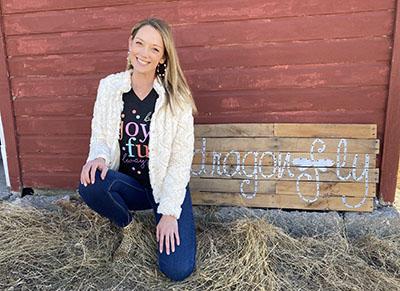Denver boutique owner says good-bye to brick-and-mortar shop, and joins community of online retailers

Allison began to hone her retail skills early on by working alongside her mother in their family-owned gift shop during her childhood and well into college. She shares, “I learned everything I needed to know about running a small business from my mother. She’s been a great source of knowledge and inspiration to me.”
Allison dreamed of owning her own business for many years, while she continued to work in different fields within the retail industry. And after many years of working for a wide range of companies, she decided to become a small business owner. She explains, “I managed the Dragonfly boutique for about 5 years before taking the steps to owning the shop. My dream of becoming a small business owner was finally coming to fruition.” The boutique carries clothing for women and children in Denver.
Allison anticipated 2020 would be her best year yet—but once the COVID-19 pandemic took over, she was stopped in her tracks and her shop closed its doors to the public. With the help of her loyal clientele and friends, Allison applied for and received a Paycheck Protection Program (PPP) loan, which helped her balance her books for some time.
But now nearly a year into the COVID-19 pandemic, small business owners continue to experience significant setbacks and reduced customer demand. Some small business owners are making adjustments to their businesses wherever they can—and for Allison, that unfortunately meant closing her brick and mortar shop to cut her expenses. And we know she’s not alone: Our new national poll revealed about a quarter of small businesses have temporarily closed their business (24%), with 21% saying they have dramatically changed their business model and/or reduced wages or compensation.
Even after having access to emergency funds, entrepreneurs across America are unable to make ends meet. Allison shares, “It’s been hard staying in business during the pandemic, let alone competing with larger retailers. Programs such as PPP and the Economic Injury Disaster Loans (EIDL) have been beneficial, but they’re only a bandaid. We need Congress to pass measures that are geared toward long-term economic recovery, which should include more state and federal grants to help us in this economic downturn.”
Through it all, Allison has always felt the support and encouragement from her family, customers and friends. She explains that her community has been a vital means for her to access information about resources and emergency funding.
While Allison gets ready to apply for a second round of PPP, she advises fellow small business owners “to persevere, work on your mental health, and to try to maintain some level of positivity. Keep open lines of communication with lenders and contacts at the Small Business Administration, so that you are aware of new developments.”
Small Business Majority is sharing stories like Allison Orr’s to educate policymakers about what small business owners need in order to survive this crisis. Help us spread the word that policymakers need to do more to support business owners in order for our economy to recover by sharing your story or signing our letter to Congress to ask for long-term relief.
